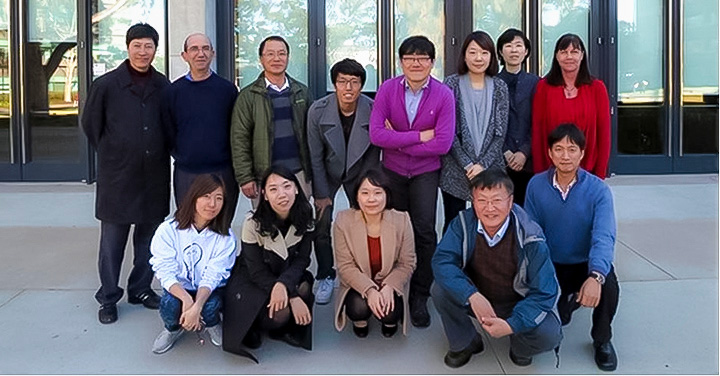By:
- Paul K. Mueller
Published Date
By:
- Paul K. Mueller
Share This:
South Korean Delegation Praises UC San Diego’s Research Ethics Program
When, in 2006, the South Korean university and scientific communities were stunned by the apparent research misconduct of stem-cell researcher Hwang Woo Suk, part of the response was to significantly increase national efforts to promote research ethics.
This renewed focus resulted in many Koreans attending international meetings on research ethics, and two of the leaders in this effort visited UC San Diego for a few days in 2011 to learn more about research ethics.
One of those individuals, Professor In Jae Lee of Seoul National University, organized a follow-up visit for a larger Korean delegation to the U.S. They chose UC San Diego as the institution best suited to provide a full perspective on how best to promote research integrity in Korea.
UC San Diego’s Research Ethics Program serves as a resource for the entire campus to identify and address ethical challenges intrinsic to the conduct of science, engineering, and other forms of academic scholarship, foster learning about research ethics, and meet federal funding requirements for education in research ethics.

Michael Kalichman (back row, second from left), director of UC San Diego’s Research Ethics Program, hosted a delegation of scientists and scholars from South Korea who came to campus to study our successful research-ethics programs and practices. “It was a great honor for me to participate,” said one attendee.
Directed by Michael Kalichman, adjunct professor of pathology and part of the Office of Research Affairs, the program seeks to maintain and sustain UC San Diego's success and identification as an international leader in fostering integrity in research.
Part of that program, the Center for Ethics in Science & Technology (Ethics Center), brings the public and scientists together to explore how science can best serve society. Through forums, projects, and resources, the center gives all stakeholders an opportunity to share perspectives on the ethical implications of new developments in science and technology.
The Ethics Center is an independent program that has a close working relationship with UC San Diego, the University of San Diego, and San Diego State University.
The university’s prominent focus on research ethics helped persuade the South Korean scientists and scholars to consult Kalichman and his colleagues.
Accordingly, a delegation of 10 Koreans visited campus for five days earlier this year. During that time, they attended one of Kalichman’s courses—Ethics and Survival Skills in Academia, taught since 1996—and the Biomedical Ethics Seminar Series, running monthly since 1999.
In addition, they participated in train-the-trainer workshops conducted by Kalichman and his colleague Dena Plemmons, assistant adjunct professor in anthropology.
"This was not only a distinct honor for UC San Diego,” says Kalichman, “but it was also an opportunity to better understand the differences and similarities between the research environments of Korea and the U.S."
The opportunity will lead to concrete improvements. According to the leader of the Korean delegation, he has been charged—based on what the delegation learned in this visit —with developing national recommendations for regulations, policies, guidelines, and education programs with respect to responsible conduct of research.
Seoul National University’s Lee shared some of the delegation’s comments about the training they received:
- "I heartily appreciate your hospitality and wonderful lectures during the research integrity workshop. I was very impressed with your endeavors to organize, prepare, and carry out this program and invite several speakers. I and our colleagues are sure that all things you provided were very helpful and insightful for us to understand the current research integrity policies and regulations and the research ethics education programs."
- "We were all satisfied with this workshop. It also gave me a good chance to deepen my understandings and experiences about the research ethics of U.S. A. I will be in charge of the design and implementation of our new research ethics education program when I go back to my country."
- "Thank you for everything you have done for us."
- "It was a great honor for me to participate in the program at UC San Diego."
The honor, says Kalichman, goes in both directions. It’s gratifying that the university is recognized for a leadership role in research ethics, he says, and he and his colleagues gained valuable insights into the challenges faced by the South Korean visitors. They also gained a strong respect for the South Koreans’ willingness to learn from mistakes and seek out those who might offer help and advice.
“Different members of the research community and different research disciplines are likely to require different goals, content, and approaches to research ethics education,” says Kalichman, “but the entire community benefits from the diverse, ongoing conversations we help conduct about the ethical dimensions of research.”
Share This:
Stay in the Know
Keep up with all the latest from UC San Diego. Subscribe to the newsletter today.



